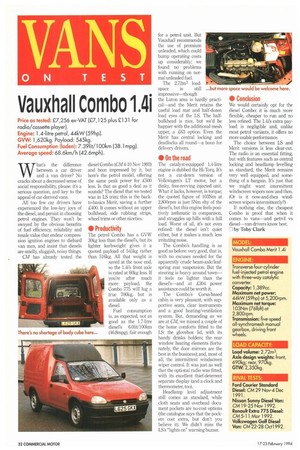Vauxhall Combo 1,41
Page 34

If you've noticed an error in this article please click here to report it so we can fix it.
Price as tested: £7,256 ex-VAT (£7,125 plus £131 for radio/cassette player).
Engine: 1.4-litre petrol, 44kW (59hp).
GVW: 1,620k9. Payload: 545kg.
Fuel Consumption (laden): 7.391it/100km (38.1mpg). Average speed: 68.6km/h (42.6mph).
What's the difference between a car driver and a van driver? No cracks about a decreased sense of social responsibility, please: it's a serious question, and key to the appeal of car-derived vans.
All too few car drivers have experienced the low-key joys of the diesel, and persist in choosing petrol engines. They won't be swayed by the obvious benefits of fuel efficiency reliability and resale value that endear compression ignition engines to diehard van men, and insist that diesels are smelly, sluggish, noisy things.
CM has already tested the diesel Combo (CM 4-10 Nov 1993) and been impressed by it, but here's the petrol model, offering the same peak power for £500 less. Is that as good a deal as it sounds? The diesel that we tested was in LS trim; this is the backto-basics Merit, saving a further £400. It comes without an upper bulkhead, side rubbing strips, wheel trims or other niceties.
• Productivity
The petrol Combo has a GVW 30kg less than the diesel's, but its lighter kerbweight gives it a quoted payload of 545kg rather than 516kg. All that weight is saved at the nose end, so the 1.4i's front axle is rated at 60kg less. If you're after much more payload, the Combo 775 will lug a true 700kg, but is available only as a diesel.
Fuel consumption is, as expected, not as good as the 1.7-litre diesel's 6.014/100km (46.8mpg), fair enough for a petrol unit. But Vauxhall recommends the use of premium unleaded, which could bump operating costs up considerably; we found no problems with running on normal unleaded fuel.
The 2.72m3 load
space is still impressive—though the Luton area is hardly practical—and the Merit retains the useful load mat and half-dozen load eyes of the LS. The halfbulkhead is nice, but we'd be happier with the additional mesh upper, a £63 option. Even the Merit has central locking and deadlocks all round—a boon for delivery drivers.
• On the road
The catalyst-equipped 1.4-litre engine is dubbed the Hi-Torq. It's not a cut-down version of Volkwagen's LT motor, but a dinky, free-revving injected unit. What it lacks, however, is torque; the quoted figure of 103Nm at 2,800rpm is just 5Nrn shy of the diesel's, but this engine feels positively asthmatic in comparison, and struggles up hills with a full load. Worst of all, it's not even refined: the diesel isn't quiet either, but it makes a much less irritating noise.
The Combo's handling is as good as before: very good, that is, with no excuses needed for the apparently crude beam-axle/leafspring rear suspension. But the steering is heavy around town— it feels no lighter than the diesel's—and at 1304 power assistance could be worth it.
The Combo's Corsa-based cabin is very pleasant, with supportive seats, clear instruments and a good heating/ventilation system. But, demanding as we are at CM, we missed a couple of the home comforts fitted to the LS: the glovebox lid, with its handy drinks holders; the rear window heating elements (fortunately, the door mirrors are the best in the business); and, most of all, the intermittent windscreen wiper control. It was just as well that the optional radio was fitted, with its excellent thief-deterrent separate display (and a clock and thermometer, too).
Headlamp level adjustment still comes as standard, while cloth seats and overhead document pockets are no-cost options (the catalogue says that the pockets cost extra, but don't you believe it). We didn't miss the I.S's "lights on" warning buzzer.
• Conclusion
We would certainly opt for the diesel Combo: it is much more flexible, cheaper to run and no less refined. The 1.4i's extra payload is negligible and, unlike most petrol variants, it offers no more usable performance.
The choice between LS and Merit versions is less clear-cut. The radio is an essential fitting, but with features such as central locking and headlamp levelling as standard, the Merit remains very well equipped, and something of a bargain. It's just that we might want intermittent windscreen wipers now and then. (Or is it now-and-then windscreen wipers intermittently?) If nothing else, the cheapest Combo is proof that when it comes to vans—and petrol vs diesel—van drivers know best.
Ti by Toby Clark
























































































